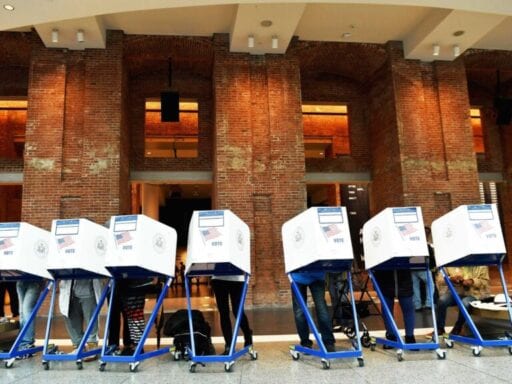Friday, the governors of New York and Kentucky signed executive orders expanding vote-by-mail access.
New York and Kentucky announced new programs on Friday aimed at improving access to mail-in ballots, as both states work to find ways to limit interaction at the polls during upcoming elections amid the Covid-19 pandemic.
On Friday, New York Gov. Andrew Cuomo and Kentucky Gov. Andy Beshear both signed executive orders mandating applications for absentee ballots be sent to all of their states’ voters — upon returning the applications to state officials, voters will receive ballots.
“I am issuing an Executive Order to ensure every New York voter automatically receives a postage-paid application for an absentee ballot because no New Yorker should have to choose between their health and their right to vote,” Cuomo said in a statement.
Kentucky’s plan does not include prepaid postage, but does require the state to create a website so voters can request ballots online. It also waives the requirement for absentee voters to notarize their ballot applications.
“While there will be significant education and work required, we are committed to making sure this election will be held in a safe manner while we are in this worldwide health pandemic,” Beshear said in a statement.
Both Kentucky’s and New York’s primary elections have been postponed to June 23 because of the coronavirus outbreak. New York’s was originally scheduled for April 28, and Kentucky’s for May 19.
New York has become the epicenter of the outbreak, with at least 271,000 confirmed Covid-19 cases as of April 25, and more than 16,000 deaths. Kentucky has nearly 3,800 cases, with 200 deaths.
The push for increased absentee voting in both states comes weeks after a primary election in Wisconsin on April 7 illustrated the risk of forcing people to stand in long lines during an infectious disease outbreak. That election led to at least 19 Wisconsin voters being diagnosed with Covid-19.
Hoping to avoid similar scenarios, other states — like Ohio — have begun making voting an entirely mail-in process. In some states that have not taken that step, certain specific jurisdictions, such as Florida’s Miami-Dade, Broward and Palm Beach counties — the last of which being where President Donald Trump is registered to vote — have also established their own plans to mail out absentee ballot request forms to all voters.
But such measures have faced political pushback, with many Republicans, including Trump, arguing that mail-in voting carries with it a risk of fraud. Voting experts have disputed these claims, finding voter fraud to be incredibly rare and noting that when it does happen, it does not privilege one party over another.
Scattershot efforts have some federal lawmakers calling for a national vote-by-mail system
Nationally, some lawmakers are working to expand mail-in voting for the long term. Sens. Ron Wyden (D-OR) and Amy Klobuchar (D-MN) plan to introduce an updated bill that will expand early and absentee voting, and mandate voting contingency plans for future emergencies like coronavirus.
As Vox’s Ella Nilsen has reported, 34 states allow all voters to vote by mail. The remaining 16 states require applicants to provide an excuse — such as serving in the military or living abroad — to request a mail-in ballot. (New York has such a requirement, which is functionally waived under Cuomo’s executive order.)
It remains to be seen how the coronavirus will affect November’s general election — and whether efforts to broaden the availability of vote-by-mail will come to fruition by then.
At a hearing on the subject on Wednesday, elections experts warned there may not be enough time to prepare for a nationwide mail-in election in November. States may not have the time or resources to acquire the envelopes, ballots, and scanning machines needed, Washington state Secretary of State Kim Wyman told Wednesday’s panel.
“With the impacts of Covid-19, I am very concerned that with only six months really to implement vote-by-mail or absentee voting in a jurisdiction, that it’s going to be a heavy lift,” she said. And she added that poorly implemented absentee voting structures could undermine faith in the election’s result.
On the state level, Ohio has seen the difficulties Wyman outlined. In March, its primary was postponed at the last minute, causing confusion. The state decided to move to an entirely mail-in process. Now, some voters may not receive ballots in time to vote, Ohio’s secretary of state has said. It’s a reminder for increasingly cash-strapped states — and for federal lawmakers hoping to create national vote-by-mail programs — that to ensure a smooth transition to mass mail-in-voting this fall, action must be taken now.
Support Vox’s explanatory journalism
Every day at Vox, we aim to answer your most important questions and provide you, and our audience around the world, with information that has the power to save lives. Our mission has never been more vital than it is in this moment: to empower you through understanding. Vox’s work is reaching more people than ever, but our distinctive brand of explanatory journalism takes resources — particularly during a pandemic and an economic downturn. Your financial contribution will not constitute a donation, but it will enable our staff to continue to offer free articles, videos, and podcasts at the quality and volume that this moment requires. Please consider making a contribution to Vox today.
Author: Anya van Wagtendonk
Read More



